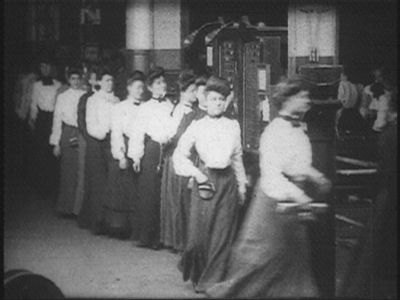A film explores the era when dialing “0” meant getting a live voice
In an age when telephones now snap and transmit photographs, the timing is right for Caroline Martel’s examination the early years of the telecommunications industry when women worked as telephone operators.
In theory, Martel’s project sounds akin to a straightforward documentary like Connie Field’s classic “The Life and Times of Rosie the Riveter.” Martel has a great deal more imagination, though. She’s conceived this film as science fiction, narrated by “the ghost of invisible women workers without whom the 20th century would not have been the same.”
The voice-over is delivered in French by actress Pascale Montpetit.
The film traverses decades of industrial and self-promotional films produced by telephone companies in the days before de-regulation. Martel relies entirely on this work, shooting no new material herself. The result recalls both the essay films of French director Chris Marker and the American avant-garde tradition of found footage appropriation.
Needless to say, much of the material unearthed by Martel is blatantly sexist, with depictions of “gals” who spend their downtime practicing songs for Christmas parties. However, she’s not interested in simple condemnation or mockery. She’s awake to the potential lyricism of industrial films and the dated strangeness of previous visions of technological modernity.
“The Phantom of the Operator” is full of oddly beautiful images, like a phone floating in slow motion through the air and a tracking shot of a woman, slowly becoming more distant as she puts files away. These impressionistic qualities don’t negate the film’s political points. Early female telephone operators performed important, if at times menial, work. Rather than merely being technicians, they offered a “voice with a smile.” Even if this notion catered to stereotypes, Martel sees it as preferable to the coldness of dial tones and computerized service, which threw women out of jobs, not liberating them.
While “The Phantom of the Operator” seems grounded in a nostalgic fondness for old technology, it concludes with Montpetit bringing us back to the present and challenging us to imagine a better future.
gaycitynews.com


































